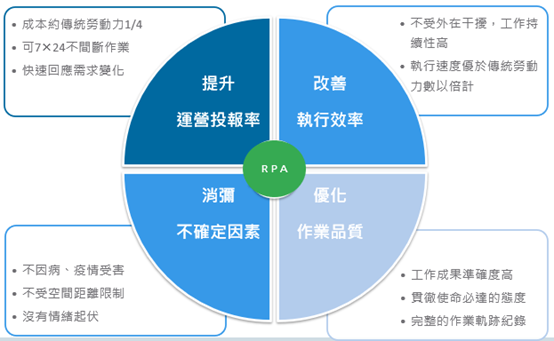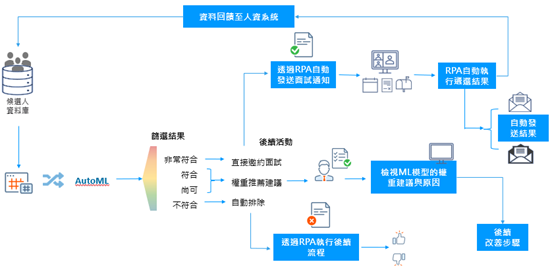Have you ever heard of robotic process automation, or “RPA” for short? What is RPA? Where to use RPA? If you are interested in knowing the advantages, scope of application, and cases of application of RPA, stay with us. We will sort out and explain what RPA is in this article.

What is RPA? This is the acronym for Robotic Process Automation. It refers to the software solutions that automatically assist office workers in completing routine work. By setting up automatic processes and specifications, RPA can imitate human behavior in using different computer systems to help complete unimportant jobs.
Why do businesses need RPA? First, ask ourselves honestly if we have the same experience: When repeating the same operational process, besides getting unmotivated and tired, we may make mistakes out of negligence in simple procedures and even feel that it is a waste of time. With the intervention of RPA, besides solving these problems, it also brings the following four advantages:

Compared to traditional labor, RPA remains unaffected by external actors-- it only focuses on the work with high continuity to quickly complete the assigned tasks.
Traditional labor may get tired and become inattentive after a long time working, or make mistakes out of negligence. In addition to the absence of emotional swing, RPA can achieve high accuracy at work and maintain a full track of operation through complete settings. Besides reducing errors and improving operation quality, RPA enables the traceability of operation to facilitate improvement and management as necessary.
In addition to taking over unimportant jobs for workers to focus on jobs with more benefits, RPA enables a lower cost of investment, higher return on investment, and flexible scalability to help businesses increase overall return on investment.
RPA remains unaffected by the impact of uncertain factors such as illnesses, epidemics, and other force majeure events. RPA software enables businesses to embrace business continuity in the pandemic regardless of space.
In what areas can we use RPA? In principle, RPA is recommended for jobs with the following characteristics:
The operating procedures of RPA is easy and clear: Setting up the workflow of the actual job➜manual verification of front-end information➜running in RPA. Then, RPA can complete the assigned tasks quickly and correctly.
Below are two cases that demonstrate the benefits that RPA brings to businesses.
Data consolidation of SAs


Assistance in checking and consolidating information on product prices is one of the routine jobs of sales assistants (SAs). As the operating procedures of this job are simple and information must be quickly, sharply, and accurately provided in a sales emergency, RPA is a perfect solution for this job.
As long as the correct procedures are set and product items are verified, SAs can leave the subsequent inquiry and consolidation jobs to RPA. In addition to shortening the labor operating time, RPA can reduce errors and provide sales personnel with information with correct contents received in real time to improve the quality of office collaboration.

The traditional process of workforce recruitment covers CV screening, interview arrangement, and verification of arrival and data delivery. The process is time-consuming and includes lots of repeated and boring procedures which can reduce the work enthusiasm of employees. Additionally, the subjectivity of staff may affect CV screening and a long waiting may discourage applicants.
RPA intervention in distributing interview notices and results and the use of digital tools like machine learning automation (autoML) in talent selection not only significantly shorten the operating time of the recruitment process but also minimize staff subjectivity so that businesses can find the required talent more quickly.
As automation and digital transformation are favorite topics of our times, and RPA is the first step for businesses to achieve digital transformation, let us start with work efficiency enhancement; let RPA help your business optimize operating quality to increase return on investment and make you one of the businesses that gets ahead of tradition and steps into future trends. If you would like to learn more about RPA, please Contact Us for special staff to introduce and explain more to you.